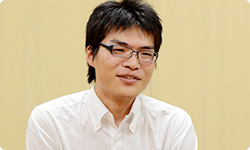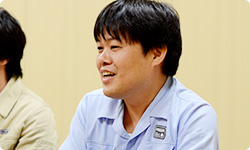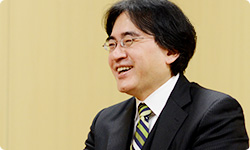3. Empathy
Motoyama-san, have you sensed any difference between the design of a PC or tablets and the design of gaming devices?
I think the situations you use them in are completely different. You use a PC on your desk and you use a smartphone while on-the-go. However, you use Miiverse to communicate while playing a video game, so my impression of it was that it was quite a bit different from what I was used to.

At first, we talked quite a lot about things like whether you would set it down and play games or hold it in one hand. And if, on a suggestion from Mizuki-san, I said, “Let’s put a button here,” Motoyama-san would ask, “Do we really need that?” and, “Who is going to use that? And when?” (laughs)
Yes, sorry. (laughs) I try to imagine actual situations, like, “Exactly when would one use this?” If I asked, “Will anyone really use this?” and simulated it and thought, “No, it’s unnecessary,” then I tried to honestly convey that. And I’ve thought about why we need buttons and changed the way I view their necessity.
After you had been working on it a bit, did you make any new discoveries?
When we had reached the stage to start working on debugging it, more things were flying back and forth than I had imagined. There were all kinds of responses, so I could tell it was fun.
It won’t be long before it’s really up and running.
Yes. During debugging, we set up a hypothetical Mario community and I watched the comments. My idea of it grew a lot and I thought, “Oh, so this is what it’s like when you actually play a game with it.”
Someone posted, “I can’t clear this stage!” and someone replied, “You have to step on Luigi!” Then the first person said, “I did it!” Watching that back-and-forth, I thought, “Oh! This is it!”
I think people will use Miiverse in more ways than we ever imagined, so I’m really looking forward to it.
Past Internet services were like that. When lots of people get together, the creative wisdom is incredible.
That’s right. At first, Flipnote Studio was about evaluating Flipnotes, but it’s come to be more like a chat service. A lot of the Flipnote posts themselves are like, “Let’s all chat!” so it’s really interesting.
I think you made concentrated and speedy progress. What do you think is the reason that you could come this far?
Well, at a previous job, Yuzawa-san worked on the Q&A site Yahoo! Chiebukuro20. And before my current job, I worked on the Q&A service Jinriki Kensaku Hatena21. We were in the same field.20. Yahoo! Chiebukuro: A knowledge community service operated by Yahoo! Japan.21. Jinriki Kensaku Hatena: A question-and-answer website operated by Hatena Co., Ltd.
You were rivals! (laughs)
We were! (laughs) When we first met, we had a good time discussing what a coincidence it was. So basically, when it came to the Internet service aspect, we had shared knowledge from the start.
You began with a certain degree of trust, so you started from a state of “empathy”.
Yes. For example, when Mizuki-san came to discuss specifications, instead of saying, “I’ll check with Hatena,” as you normally would, I could make a decision and answer him right away, saying, “Hatena should be able to handle that.”
You answered in their place?! (laughs)
I did. And when I checked with Hatena later, we were on the same wavelength. Having both worked in web development for so long, we were at the same level of understanding when it comes to things like what was easy and difficult to do. I think that’s one reason we were able to move so quickly this time.

I see. I’ve heard Mizuki-san say quite a few times how great it is that you worked on this, Yuzawa-san. Today, that has really become clear for me.
There we really had a sense of trust. And they trusted us, so instead of talking it over at the start and then working on it, it was good that we were able to start by just making something and continue to work on it as we moved forward.
These chance encounters are really strange. Before, you were making services as rivals, but…
(looking at each other) We know! (laughs)
Also, we made a chat room in the development environment. If you posted something, someone would reply right away. It was like that person’s seat was right there, so we were able to carry out our work with hardly any sense of distance.
And we held meetings several times a week, so we could speak our opinions freely. As we met, we gradually bonded as a team, like everyone at Nintendo were employees of Hatena! (laughs)
Really? Not the other way around – like you were employees of Nintendo?
No, because they came to see us most of the time. Sometimes they were working away right behind my seat at the office! (laughs)
Did you only get close because you met often? I sense there may be more to it.
Well, maybe it was good that I called Motoyama-san by the nickname Kurage-san (Mr. Jellyfish). (laughs)
Oh, right! It probably helped that we called each other by nicknames.
Within Hatena, we usually call each other by Hatena IDs, and Motoyama-san’s ID says Kudakurage (siphonophore), so I always called him Kurage-san. Maybe that helped to knit us together? (laughs)
Yeah, I lost track of everyone’s real names!
That’s not true!
(laughs)
When the project began to get stuck, I was like, “Let’s camp out overnight!” I say "camp it out", but it was really like we all just crammed into a room somewhere for a day and concentrated on our work. I think it went smoothly because we could easily do things like that.
At first, we were developing in an apartment room that Hatena leases that we call Crema. The staff from Nintendo liked it so much that they said, “It’s fun coming here!”
Editor’s note: Crema is the abbreviated name for “Creator’s Mansion”. In Japan the word “mansion” is used to refer to an apartment or flat.
It was like ten adults packing into a one bedroom flat! (laughs)
And afterwards, we would go to their regular office and start the actual development. Shoes weren’t prohibited there, but I noticed that everyone took off their shoes anyway. I asked if we should take off our shoes too, but they said we didn’t have to.
Editor’s note: In Japan people always take their shoes off when they’re at home, but keep them on at the office.
We take off our shoes because our original group of developers was always working in that small flat. It’s like we can’t get ourselves motivated unless our feet are free! (laughs) Only the people who want to take off their shoes do, so it’s totally fine to keep them on.
But we actually want to take them off, too! (laughs)
Oh, really? (laughs)
There was a time when HAL Laboratory22 worked in a flat while I was residing with them, too. I don’t think I could program without taking off my shoes, either! (laughs) But to be able to concentrate on something from morning to evening was great. Maybe I’ll drop by sometime…22. HAL Laboratory, Inc.: A video game developer that has worked on products including the Kirby and Super Smash Bros. series. Satoru Iwata once served this company as president.

Yes, please drop in! (laughs)
